"It's very difficult to keep the line between the past and the present." |
Edith 'Little Edie' Bouvier Beale, in Grey Gardens, 1975 |
I've always liked black and white films. They make me think of rainy Sundays, of darkened cinemas, near pitch until a daytime scene illumines the room and the brightness hurts your eyes. They carry a sense of depth and nostalgic allure that that I often find to be lacking in colour ones. Although something of a contradiction, these same feelings are stirred whenever I watch watching contemporary films which use monochromatic stock as a purposeful aesthetic statement such as the work of Béla Tarr, Isaac Julien's Looking for Langston, Jim Jarmusch's Coffee and Cigarettes, Anton Corbijn's Control or most recently, Francis Ford Coppola's Tetro. By its very nature, the polarity of and sharp contrasts within a monochromatic image stand out and demand to be remembered.
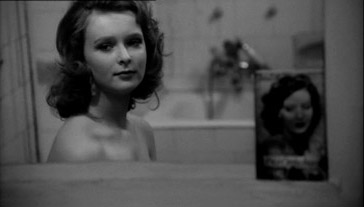
It's no coincidence that some of the greatest moments in cinema also happen to be filmed in black and white: the slashing of an eyeball in Un chien andalou / An Andalusian Dog; Citizen Kane's 'Rosebud' obscured in the snow; the 'Odessa steps' of Bronenosets Potyomkin / Battleship Potempkin or Jean-Pierre Léaud looking out to the sea in the final moments of Les Quatre Cent Coups / The 400 Blows. I doubt that these moments would be as powerful if they were filmed in colour. For me, they capture the very essence of why cinema is classed as an escapist medium, for the simple reason that the images on screen, purely because of their lack of colour, look nothing like the world outside my window, and therefore become a window to another one.
In the case of Márta Mészaros' Napló gyermekeimnek / Diary for My Children, it's a window to another time and another country that, for most people, has remained obscured from view, thanks to a rather turbulent road to recognition. This month, it finally makes its UK DVD debut, through Second Run – a release which itself was thwarted by delays. The first in Mészaros' celebrated 'diary trilogy' (the second and third instalments, Napló szerelmeimnek / Diary for My Loves and Napló apámnak, anyámnak / Diary for My Mother and Father will also be released by Second Run at a later date). In its native Hungary, following production, the film was shelved for two years, and then rejected for over a decade by the Communist censor board for over a decade. Thankfully, reception elsewhere was much more favourable, winning The Grand Prix Spécial du Jury at Cannes in 1984, and three years later, Mészaros would become the first female winner of the Silver Bear at Berlin (and also earn an additional Golden Bear nomination).
Set during the years 1947-1953, this semi-autobiographical story which follows the parallel trajectories of orphaned teenager Juli (Zsuzsa Czinkóczi) and her foster-mother Magda (Anna Polony), a revolutionary for the Communist Party, who takes in Juli and her ailing adoptive grandfather (Pál Zolnay) when they arrive in Budapest after escaping Nazi rule. The two are often at odds, with Juli rebelling against Magda out of distrust. Increasingly isolated and searching for her place in the world, she turns to János (Jan Norwicki, playing the dual role of her uncle and late father, bridging the gap between the past and present) for support. Over the years, as Juli gains confidence and learns more about her past, Madga gradually loses more of her own idenitity as she bows under the pressure of working for the Party, rising through its ranks. Juli eventually breaks free of Magda, moving in with János and his disabled son, András (Támas Toth).
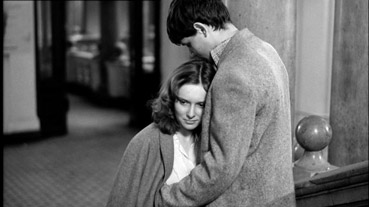
Diary for My Children fits firmly to the tradition of 'personal history' film, where well-known, typically turbulent historical periods or events are interwoven into a fictitious narrative. The film's closest relative is undoubtedly Alain Resnais' Hiroshima mon amour / Hiroshima, my Love, which employs the same 'memory play' flashback structure to depict an affair between a Japanese man and a French woman, during World War two. Another, though less politically-motivated sibling is Max Ophuls' romance epic, Letter from an Unknown Woman. From the moment Juli appears on screen, it's hard not to draw parallels between her Joan Fontaine's innocent idealist, Lisa.
Mészaros' marriage of the seemingly diametrically opposed he worlds of documentary and fiction in the film's aesthetic and narrative also combines the notions of film as art, film as entertainment and film as record. The quasi-documentarist style and incorporation of archive footage is a clear echo of her early documentary features. This impulse carries over into the subtle, understated acting performances which owe more to Italian neorealism than to the melodramatic connotations of the "women's film" label the director's work was afforded by critics (a categorisation Ophuls was also misappropriated with). Though it may explore life from a female and very personal perspective, two common tropes of the women's film – definitely a case of herstory rather than history, but even that seems too reductive a description. This is also a film concerned with human condition; of learning about oneself and gaining a true sense of identity. A more appropriate term for Diary is perhaps, then is 'everyman film,' since few could fail to relate to all that befalls Juli and those around her.
For viewers with a limited knowledge of Hungarian political and social history, Diary is at times a difficult film to grasp and could alienate some viewers (Catherine Portuges' essay included with this release is particularly helpful in that respect), but for those with staying power, it's a film which gives back to its audience in spades. If these contexts are placed aside – however sacrilegious that may seem – we're left with something rather more familiar and knowable: the classic coming-of-age tale. Learning things in tiny scraps just as Juli remembers them makes our connection with her particularly strong, matching the beguiling central performance of Zsuzsa Czinkoczi. When you consider just how young she was at the time of production – which certainly lends the film an added air of authenticity – placed amongst many other strong lead actors, including Jan Norwicki, it makes her abilities all the more remarkable.
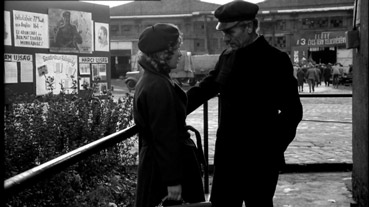
Juli is the beating heart of this film. Everything we see and hear is filtered through her eyes and ears. Though much of what we learn about the effects of the Party throughout Juli's life come from the comments of other people – particularly during a dinner party at Magda's house, where Juli's grandfather and another guest discuss the working conditions in a local factory – there are also other moments constructed solely from Juli's memories, like a scrapbook. Tellingly, these are frequently moments which she's been forbidden to discuss. One such scene occurs after Juli is chastised by her grandfather for bringing up the fate of her late parents. When he leaves the kitchen, she sits alone, lost in a memory. We then see a young Juli, sitting in her father's workshop, watching him as he sculpts. Zsolt Döme's score works particularly well here, adding a gentle melancholy to a recollection we already know is painful one.
These flashbacks are shown without any real context, cut in seamlessly to the rest of the narrative, which sometimes makes them hard to spot. Some are so short – slipped in between other longer sequences of Juli walking around school or getting dressed at home – they almost feel subliminal and we wonder what triggered them, likely mirroring her emotional state. A particularly jarring instance occurs during a short scene at a stone quarry, where Juli's father is amongst those mining the material. Compared to the rest of the film – which is predominantly dark due to the naturalistic lighting of lamps and candles – the stark, cavernous space of the quarry looks glacial and otherworldly, like a distant planet or an undiscovered moon. We can barely make out Juli's tiny figure, a black dot somewhere up high. Instead, we hear her voice, echoing hollowly as she calls out to her father. There ends the scene, abruptly as it began.
Here, more than anywhere else, the cinematography of Niyika Jancsóc (Mészaros' son with fellow director Miklós Jancsó) really, almost literally, shines through, as does the quality of the print. Both are shown to great effect by some striking composition and framing choices throughout the film, and not just when close-ups are employed. This is especially important in a film where expressions and gestures almost always outweigh dialogue in terms of conveying the emotions and thoughts of the characters, acting as a secondary language. However, for Juli in particular, it's a primary language, with her role as watcher and listener even extending to the way she relates to the rest of the world. Though understanding ourselves and gaining a sense of our identity is never an easy or expeditious process, for Juli, and for us, there are never any easy answers. She never gets to know enough, is often thwarted in her attempts to learn more. Besides her grandfather, she has few connections to her past. When Magda tries to show her affection, she spurns it. When lovesick classmate Tomi declares his loves her, she bluntly tells him she doesn't feel the same way, but the two are ultimately drawn together – though it feels more like necessity than romance, until she finally grows to care for him.
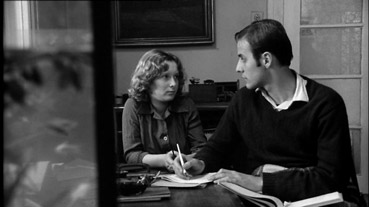
Lacking a family in the traditional sense, she creates her own. For a father, she turns to her uncle János, clearly drawn to him for his candour. While everyone is keen to keep events of the past firmly in the past, János, in more ways than one, is a link and a lone voice of dissent, speaking freely and openly about his experiences when he tells Juli about the loss of his wife and daughter in a bombing raid during World War Two, when she accompanies him home after the dinner party. For a mother, Juli's choice is cinema itself. In a bid to escape her daily life, she seeks refuge in the dark of the theatre, devouring all she sees, mimicking the gestures and mannerisms of Greta Garbo in Mata Hari. Afterward, she styles herself in the star's likeness, looking at her changed reflection in the mirror. It plays like a tragic take on fancy dress: a hollow echo of little girls dress up games where they play with their mother's make-up and shoes. Like so many seemingly happy moments in this film, it's actually one of sadness – instead a reflection and articulation of loss. A constant reminder of what she cannot have.
So often, history can feel exactly that, history, a simple chorology of past events – some dramatic but mostly tragic – whose scale are hard to digest on a human level, not for a lack of empathy, but more through lack of understanding what it was actually like to live through that history as it unfolded day-to-day. Diary is a film which taps into that desire for knowledge and that need to connect. In essence, it dusts off the history books and reaches inside the antiqued photographs, bringing them to life in more ways than one by building on the oratory tradition of someone telling their story of survival. Its one thing to read about Stalinist oppression, but its quite another to see, hear and feel it through the eyes of a person – albeit a fictional one – which we become attached to over time. Such a formula has proven itself to be a winning one several times over.
Diary for My Children is a powerful and affecting film, which is a tough, but ultimately rewarding watch, drawing in the viewer from its opening moments, keeping hold until the close of the credits. Whether you're looking for a film which puts history under a microscope without relying on Hollywood style melodramatics or gain an introduction to Hungarian cinema and/or the work of Márta Mészaros, then you'll find both, and much more here.
A consistently fine 1.85:1 anamorphic transfer from a source that's clearly undergone some careful restoration. The contrast is a tad harsh in places, withich provides some sparkling black levels but with a corresponding loss of detail in darker areas, but for much of the time the tonal range is rather lovely and the picture has the sort of punch only the best black-and-white material can provide. The sharpness and detail is very good and the image upscales to large plasma screens handsomely, with no sign of compression artefacts and grain never obtrusive. The archive footage incorporated into the narrative does stand out a little, having softer contrast, a lot more dust and a few scratches, contrasting somewhat with the cleanliness of the rest of the film.
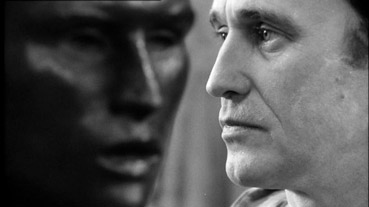
The sound is Dolby 2.0 mono, and though the dialogue is all clearly audible, the dynamic range is a more restricted than you might expect for a film made in 1984. Damage and background hiss are pleasingly absent, though.
Until now, the only other available DVD was a barebones release by French company Clavis Films in 2006. Although this predecessor only carries one extra on disc – albeit a very important one – it's still a handsome package. Given its rather troubled lineage, it's no stretch to suggest that the fact it exists on DVD in the first at all is reason enough for celebration and purchase.
Interview with Márta Mészaros (24:50)
Hearing a celebrated figure such as Mészaros speak about her work is something of a treat, and I was pleasantly surprised to see an interview on the DVD features list. Conducted in the director's home, this is more like a documentary portrait than a formal interview, and is quite similar in style and tone to the documentary extra found on Second Run's release of Věra Chytilová's Daisies. The casual setting makes this both it insightful and deeply personal look at her life and work, in her own words. Mészaros discusses her nomadic formative years, early documentary features and fiction films in detail and the most interesting reflections concern her position as a female director and the critical reception of her work. After a time, the "talking head" shooting style can become a little tedious, but Mészaros' warmth and obvious passion for directing definitely make it worth persevering to the end.
Booklet
Aside from production credits for both the film and the extra with a sprinkling of production stills, this is almost entirely dedicated to an essay on Diary by Catherine Portuges, film planner, scholar and author of Screen Memories: the Hungarian Cinema of Márta Mészaros. This is a highly-detailed and fascinating examination of the film, examined using various analytical frameworks, including its place within the body of Mészaros' work, and the socio-political landscape of Hungary. This is a surprisingly accessible piece – even if you are less well-read on Mészaros or Hungary's cinematic output – and Portuges' observations, drawn from close reading of Mészaros' films, make it particularly rewarding one.
So often, the presence of essays in high-end releases such as this can feel rather superfluous, as if merely there to make up the numbers and/or look flashy on the back of a DVD case. However, as with Peter Hames' essay on Věra Chytilová Daisies, Portuges' work most certainly deserves inclusion, since it genuinely adds to how the film can be read, understood and most importantly, appreciated.
Also included is an updated Second Run release Film Catalogue, showcasing their current collection, each with a brief description and quotes, in addition to a taster of six forthcoming titles.
This is another quality release from Second Run. I was immensely pleased to see that the high standard set previously with Daisies has been upheld. Rather than play favourites, I admire that this company continue to lavish – and yes, it is lavish – their releases with the same meticulous level of care and attention, which is a great relief when considered against a vast majority of releases, where supplementary material is increasingly sub par in relation to the films they are attached to.
This release marks the long-overdue UK DVD debut of Diary for My Children, and the long wait was most certainly worth it, finally allowing the film to reach the wider audience it deserves. Diary is one of Mészaros' most accomplished films: subtle, yet incredibly haunting, its combination of the personal and the political has lost none of its emotional resonance in the years since its release. The improvements in subtitle translation, and the director-approved high quality digital restoration alone, make this an essential purchase.
|